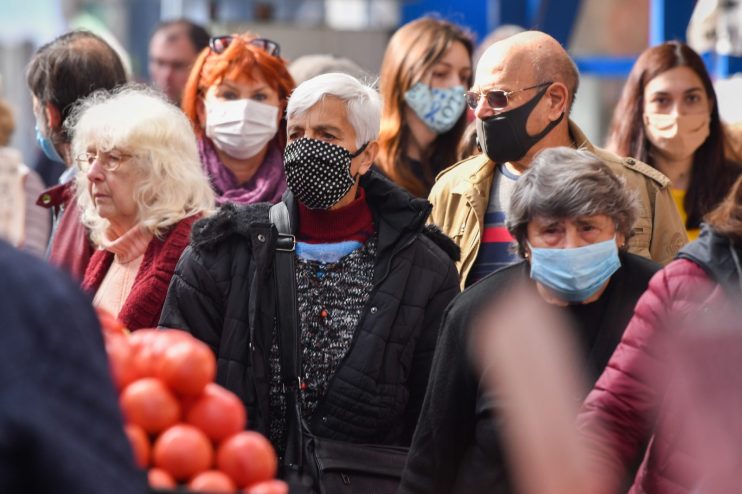Single Covid vaccine is 80 per cent effective in preventing hospitalisations among over-80s

A single injection of either the Astrazeneca/Oxford jab or the Pfizer/Biontech vaccine is more than 80 per cent effective in preventing hospitalisation among over-80s, the health secretary has announced.
Speaking at this evening’s Downing Street press conference, Matt Hancock hailed the new data from Public Health England as “extremely good news,” adding that it may help explain a recent drop in hospital admissions.
The number of patients admitted to hospital each day with Covid has plummeted from a peak of 4,576 on 12 January to just over 1,100 last week.
The UK’s chief medical officers last week downgraded the national Covid alert level, after announcing the NHS is no longer at immediate risk of being overwhelmed.
“This shows, in the real world, across the UK right now, that the vaccine is helping both to protect the NHS and to save lives,” said Hancock.
“In fact, the detailed data show that the protection that you get from catching Covid 35 days after a first jab is even slightly better in the Oxford job than for the Pfizer, albeit both results are clearly very strong,” he added.
The pre-print study from Public Health England showed the Astrazeneca jab provides around 60 to 73 per cent protection against symptomatic Covid in those over-70, four weeks after the first injection.
Meanwhile, the Pfizer/Biontech vaccine is thought to provide around 57 to 61 per cent protection for over-70s, according to the study.
EU-Astrazeneca row
It comes as a major snub to a slew of European countries that have questioned the efficacy of the Astrazeneca vaccine in recent weeks.
French President Emmanuel Macron has faced growing calls to apologise after claiming the jab was “quasi-ineffective” among older patients.
Meanwhile erroneous reports in various German media outlets earlier this year claimed the vaccine was only eight per cent effective in over-65s.
German officials later U-turned on the figure, but the false headlines have been accused of sparking a slump in uptake of the Astrazeneca vaccine across Europe.
Eleven out of 27 EU member states including France, Germany, Poland and Italy, have declined to give the jab to older people because of the lack of early clinical trial data supporting its efficacy in over-55s.
An average of just five per cent of EU residents have received their first dose of a coronavirus vaccine, according to the European Centre for Disease Prevention and Control’s Covid-19 Vaccine Tracker. The figure is as low as 4.9 per cent in France and 4.2 per cent in Italy.
In comparison, around 30 per cent of Brits have received their first dose of either the Pfizer/Biontech or Astrazeneca jabs, with more than 20m doses administered in total.
Professor Jonathan Van-Tam, England’s deputy chief medical officer, said the new data from Public Health England “clearly vindicated” the UK’s approach to the vaccine rollout.
“I’m not here to criticise other countries but I do say that I think in time, the data emerging from our programme will speak for itself and other countries will doubtless be very interested in it,” he added.
New variants
However, it is unclear whether either of the current jabs provide protection against emerging coronavirus variants.
The health secretary announced the government will plug an extra £1.65bn into the development of Covid vaccines, as ministers scramble to contain cases of a new Brazilian coronavirus mutation from spreading across the country.
Part of the funding will “go towards further vaccine testing and development, to make sure we are fast and effective in developing the next generation of Covid vaccines, including vaccines against new variants”.
“There’s a huge amount of underway work underway to ensure that we can develop the vaccines against variants as fast as safely possible,” Hancock added.
Ministers are also looking at a potential booster dose which “could tackle these evolving mutations… much as we tackle mutations from flu,” the health secretary said.
The government has already secured 50m doses of a “next generation” vaccine being developed by German biotech firm Curevac, that will be especially suited to tackling new Covid mutations.
It comes after ministers rolled out surge testing in parts of Gloucestershire today to stamp out the spread of a new Covid-19 variant first identified in Brazil.
The variant is believed to be more transmissible than the original strain of the virus and may be more resistant to the UK’s two approved Covid vaccines.
The Brazil strain, also known as the P1 variant or Manaus variant, has similar mutations found in the South Africa strain of coronavirus.
“These and other mutations are associated with reduced impact of antibodies against the virus in laboratory experiments,” said Public Health England’s Dr Susan Hopkins.
“The current vaccines have not yet been studied against this variant and we will need to wait further clinical and trial data to understand the vaccine effectiveness against this variant. In the meantime, it is important to retract cases of this new variant as closely as possible in order to limit a spread in the UK,” she added.
Six cases have been recored in the UK so far, including three in England and three in Scotland.
Two of the England cases have been found in South Gloucestershire, while a search is currently underway to locate the third case. It is thought the patient failed to provide contact details on their testing form.
Anyone who took a Covid test on 12 or 13 February but hasn’t yet received a result has been told to get in touch by calling 119 in England.
Before the Open newsletter: Start your day with the City View podcast and key market data